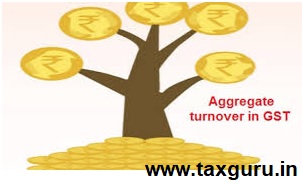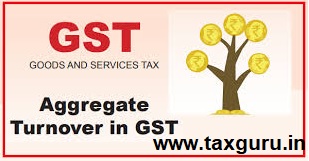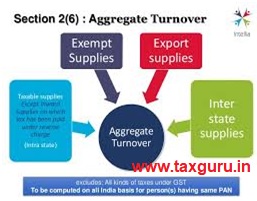Partner salary, income from salary from Company and various other income interest on Loan and deposit , Interest on debenture , rent on commercial building , rent on residential unit and Capital Gain on Shares will be added for Aggregate turnover In GST for computing threshold limit of Rs,. 20 Lacs or 40 Lacs. Lets do the analysis one by one which component of the income will be added and which component will be excluded for aggregate Turnover as per GST.
In this regard, we invite to reference to the definition of “Aggregate Turnover”, in terms of Section 2(6) of the CGST Act 2017, which reads as under

“aggregate turnover” means the aggregate value of all taxable supplies (excluding the value of inward supplies on which tax is payable by a person on reverse charge basis, exempt supplies, exports of good s or services or both and inter-State supplies of persons having the same Permanent Account Number, to be computed on all India basis but excludes central tax, State tax, Union territory tax, integrated tax and cess.”
It is clearly evident from the above definition that the Aggregate turnover is equal to the sum of value of all taxable supplies, value of exempt supplies, value of supplies towards export of goods or services or both and value of inter-state supplies of persons having same Permanent Account Number, to be computed on All India basis excluding the value of inward supplies on which tax is payable by a person on Reverse charge basis.
Section 7(1)(a) of the CGST Act 2017 stipulates that any transaction must consist the following three components to get qualify as ‘Supply ‘.

A] The transaction must involve a supply, of good s or services or both, such as sale, transfer, barter, exchange, licence, rental, lease or disposal made or agreed to be made .
B] The transaction must before a consideration by a person
C] The transaction must be in the course or furtherance of business.
In view of the above , income received form each sources has to be examine with reference to section 7[1][a] that constitute supply or not.
A person has following income which of the following income will be add up to aggregate turnover for threshold limit :
a) Partner’s salary as partner from my partnership firm,
b) Salary as director from Private Limited company
c) Interest income on partners fzxed capital credited to partner’s capital account
d) Interest income on partners variable capital credited to partner’s capital account
e) Interest received on loan given,
f) Interest received on ad vance given
g) Interest accumulated along with deposit/fzxed deposit
h) Interest income received on deposit/fzxed deposit
i) Interest received on Debentures
j) Interest accumulated on debentures
k) Interest on Post office deposits
l) Interest income on National Savings certificate (NSCs)
m) Interest income credited on PF account
n) Accumulated Interest (along with principal ) received on closure of PF
o) Interest income on PPF
p) Interest income on National Pension Scheme (NPS)
q) Receipt of maturity proceed s of life insurance policies
r) Dividend on shares
s) Rent on Commercial Property
t) Residential Rent
u) Capital gain loss on sale of shares
Interest income received from different sources : The applicant is in receipt of interest income from different sources as mentioned at para 2 under (c ), (d) , (e), (f) , (g), (h), (i), U), (k) , (1), (m), (n), (o), (p). All these interest income are out of the deposits /loans extended by the applicant. The services by way of extending deposits, loans or advances in so far as the consideration is represented by way of interest or discount (other than interest involved in credit card services), falling under SAC 9971, are exempted under Entry No.27(a) of the Notification No.12/2017-Central Tax (Rate) dated 28.06.2017.
Thus the interest earned by the applicant, out of the deposits/ loans/ advances extended, amounts to consideration and is exempted by virtue of entry number mentioned supra. Therefore in the instant case extending the deposits/ loans/ advances by the applicant is nothing but exempted service and the actual amounts of deposits/ loans/ advances become the value of the service. Thus these amounts are to be included in the aggregate turnover for registration, under the provisions of GST Act.
Partner’s salary, received as partner, from applicant’s partnership firm
The applicant is in receipt of certain amount termed as partner’s salary from the firm where the applicant is also a partner. The applicant has not furnished any documents relevant to the issue, such as copy of agreement, appointment order etc., so as to decide whether the applicant is an employee of the partnership firm or not. In case. if the applicant is a working partner and is getting salary then the said salary is neither supply of goods nor supply of service in terms of clause 1 of Schedule III of CGST Act 2017 . Further, in case if the applicant is in receipt of the amount towards his share of profit from the said partnership firm, then also the said income is not under the purview of GST as the share of profit is nothing but application of money and hence the said salary is not required to be included in the aggregate turnover for registration under the provisions of GST Act.
Salary received as Director from a Private Limited Company :
The applicant is in receipt of certain amount termed as salary as Director of a private limited company. Two possibilities may arise with regard to the instant issue of amount received by the applicant. The first possibility that the applicant is the employee of the said company (Executive Director) , in which case the services of the applicant as an employee to the employer are neither treated as supply of goods nor as supply of services, in terms of Schedule III of CGST Act 2017.
The second possibility that the applicant is the nominated director (non Executive Director) of the company and provides the services to the said company. In this case the remuneration paid by the company is exigible to GST in the hands of the company under reverse charge mechanism under section 9(3) of the CGST Act 2017 , in the hands of the company, under entry no. 6 of Notification No. 13/ 2017-Central Tax (Rate) dated 28.06.2017.
In the instant case the applicant has not furnished any documentary evidence such as copy of agreement between the applicant and the said private company, copy of appointment order, details of ESI, PF deductions etc., so as to decide whether the applicant is in receipt of salary as an employee or as an independent director. Thus in the absence of any documentary evidence, it is not possible to decide whether the amount received by the applicant is towards his services as an Executive Director or
In view of the above, the remuneration received by the applicant as Executive Director is not includable in the aggregate turnover, as it is the value of the services supplied by the applicant being an employee. Further if the applicant receives the remuneration as a Non-Executive Director, such remuneration is liable to tax under reverse charge mechanism under section 9(3) of the CGST Act 2017, in the hands of the company, under entry no. 6 of Notification No. 13/2017-Central Tax (Rate) dated 28.06.2017. Thus the value of the said services of the applicant being a Non-Executive Director are includable in the aggregate turnover, as it is the value of the taxable services supplied by the applicant, though the tax is discharged by the private limited company, under reverse charge mechanism
Rental income on Commercial Property :

The transaction of rental/ lease of commercial property amounts to supply; applicant receives periodical income towards the impugned supply of service & the same is in the course or furtherance of business and hence the said transaction amounts to supply in terms of Section 7(1)(a) of the CGST Act 2017. Thus it is a taxable supply of service having SAC 997212 and therefore the value of such supply is to be included in the aggregate turnover, for registration.
Rental income on Residential Property
The transaction of rental/ lease of residential property amounts to supply; applicant receives periodical income towards the impugned supply of service & the same is in the course or furtherance of business and hence the said transaction amounts to supply in terms of Section 7(1)(a) of the CGST Act 2017.
However “Services by way of renting of residential dwelling for use as residence, classified under SAC 997211” are exempted from the tax (GST) in terms of entry number 12 of the Notification No. 12/2017 dated 28.06.2017. Thus the impugned supply of service of renting of residential property becomes an exempted supply. Aggregate Turnover includes the value of the exempted supplies also. Therefore the income received by the applicant towards rent of residential property is to be included in the aggregate turnover.
life insurance policies, dividend on shares and capital gain/ loss on sale
The applicant is also in receipt of income out of maturity proceeds of life insurance policies, dividend on shares and capital gain/ loss on sale of The term ‘Securities’, which has the same meaning assigned to it in clause 2(h) of Securities Contracts (Regulation) Act 1956, in terms of Section 2(101) of the CGST Act 2017, includes shares, scrips, stocks, bonds, derivative instruments etc., that have been explicitly excluded from the purview of GST, by virtue of its exclusion from the definition of ‘goods’ and ‘services’, as contained in Section 2(52) and Section 2(102) of the CGST Act respectively . In the instant case the dividend on shares, capital gains/ losses on sale of shares are relevant to the shares (securities) and the income earned in this relation is nothing but application of money. Therefore this income earned out of shares, which are excluded from the definition of goods or services, also gets excluded from the said definition of goods / services. Therefore they are not relevant to the aggregate turnover and hence are not required to be added to the aggregate turnover for registration under the provisions of GST Act
The applicant is also in receipt of income out of maturity proceeds of life insurance policies. The impugned income would be received on maturity of the insurance policies i.e. on closure of the insurance contract consequent on maturity of the said policies. The insurance premium of policies is taxable under GST, being the consideration for the services provided by the insurance companies. Therefore on completion of the said contract / maturity of the policy, there would not be any service involved between the policy holder and the insurance company. Therefore the amounts received on maturity of the insurance policies are not relevant to the aggregate turnover and hence are not required to be added to the aggregate turnover for registration under the provisions of GST Act
Above Issue have been resolved in AAR Karnatka in case of Anil Kumar Agrawal
Disclaimer :
The contents of this article are solely for information and knowledge and does not constitute any professional advice or recommendation. Author does not accept any liability for any loss or damage of any kind arising out of this information set out in the article and any action taken based thereon.
About the Author: Author is Sr. Partner of G R A N D M A R K & ASSOCIATES , Chartered Accountants in Gurugram [ Haryana] and Domain Head of GST Department of GMA . He can be reached at [email protected]. WWW. grandmarkca.com






Sir, the discussion in the Article as well as few ARs are harping around the aggregate turnover as defined u/s 2(6) of CGST Act whereas the term aggregate turnover is defined once again separately us/22 by way of an Explanation which states “aggregate turnover shall include all supplies made by a taxable person,……..”. Now my point is that how can same term be defined in two different ways for different purposes? If required to be considered the definition as per Explanation to Sec.22, then the definition u/s2(6) is redundant. Please clarify sir.
Can deposit of own money with Bank, Post Office etc be equated with giving loans and advances by banks and companies so as to qualify for inclusion of interest income earned from Bank Deposits and PO deposits for the calculation of GST Turnover